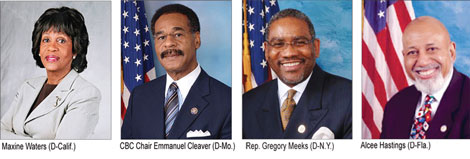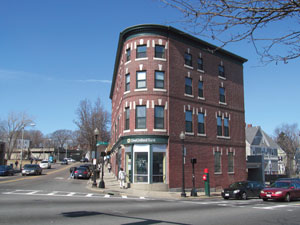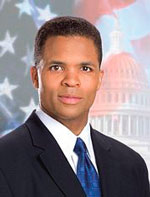Questions arise about targeting of Black lawmakers
By Freddie AllenNNPA Washington Correspondent | Last updated: Jun 5, 2012 - 1:19:02 PM
What's your opinion on this article?

|
WASHINGTON (NNPA) - In September 2008, at the height of the financial crisis, Rep. Maxine Waters (D-Calif.) was working to make sure minority-owned banks didn’t get left behind. She arranged a meeting between Treasury Department officials and representatives for the National Bankers Association, an organization that represents minority-owned financial institutions.
OneUnited, a Black-owned bank with offices in Los Angeles, Boston, and Miami, and the only bank represented at the meeting, dominated the discussion. Without government assistance, heavy investments in the floundering Freddie Mac and Fannie Mae threatened to sink OneUnited. The bank executives asked for $50 million. Three months later, OneUnited received $12 million in federal bailout funds.
The money not only saved the bank, but also rescued OneUnited’s shareholders, including Rep. Waters’ husband, Sidney Williams.

Black-owned One United bank in Dorchester, MA. Photo: John Phelan
|
Rep. Waters counters that she did nothing wrong as a longtime advocate for Black banks. Three years after the investigation was announced, she is still waiting for the investigation to be concluded.
Rep. Waters is not the only Black member of Congress under investigation.
According to the Congressional Research Service (CRS), there are 44 Blacks serving in the 112th Congress, 8.1 percent of the membership. However, 35 percent of the ongoing House Ethics committee investigations have targeted Blacks.
At one point in 2009, seven Black congressmen were subjects of full-scale probes by the Ethics Committee while not a single White colleague was being given the same treatment.
Of the 10-member House Ethics Committee, only one member—Donna Edwards (D-Md.)—is Black.
Congressional Black Caucus Chairman Emanuel Cleaver has sent a letter to the House Ethics committee expressing deep concern over “the protracted length, abnormal number, motive and fairness of pending matters” involving investigations into the conduct of CBC members.
The Citizens for Responsibility and Ethics in Washington, an independent watchdog group that promotes accountability in government, said 17 members of Congress, including six members of the CBC, are believed to be under investigation by the Department of Justice, Federal Bureau of Investigation, the House Ethics Committee, the Senate Select Committee on Ethics, or the Office of Congressional Ethics.
“The Ethics committee is very secretive committee; there could be even more (investigations),” Manu Raju, senior congressional reporter for Politico, said in an interview with MSNBC. “The question is about whether or not there are.”
There is no question that some members of the CBC are targets of ethics inquiries.

Rep. Jesse Jackson, Jr. (D-Ill.)
|
In March 2011, Winsome Packer filed a lawsuit against Rep. Alcee Hastings (D-Fla.) alleging sexual harassment. Ms. Packer worked with Rep. Hastings on the Commission on Security and Cooperation in Europe from January 2008 to February 2010. She claims she was subjected to “unwelcome sexual comments, and unwelcome touching by Mr. Hastings.” She said she lived with the constant fear of being fired. The Ethics Committee decided not to pursue a full-scale investigation of the 10-term congressman, but continues to review the case.
Rep. Gregory Meeks (D-N.Y.) failed to report a $40,000 loan he received from personal friend and businessman Edul Ahmad in January 2007. When Rep. Meeks learned that the OCE was looking into the loan, he accepted a $59,650 loan from another donor to repay Mr. Ahmad. The OCE sent the Meeks’ investigation to the House Ethics committee on May 2011. Last July, the FBI arrested Mr. Ahmad, who was linked to a mortgage fraud case. Earlier, the Federal Election Commission fined Rep. Meeks $63,000 for, among other things, improperly billing the campaign for his personal-trainer expenses.
Rep. Laura Richardson (D-Calif.) is facing a number of allegations associated with her use of taxpayer-funded House staff. Lawmakers are prohibited from using congressional staff to work on political campaigns and run personal errands. In 2011, Rep. Richardson allegedly directed her House aides to collect information on neighborhoods outside of her 37th District and also asked them to prepare materials for her constituents to be used in local redistricting hearings. Last November, the House Ethics Committee established a subcommittee to find out if Rep. Richardson broke any laws. In August 2009, the OCE also opened an investigation to determine if the Long Beach Democrat received special treatment from a banker when one of her homes was placed in foreclosure. In June 2010, the House Ethics committee dismissed the complaint.
In December 2011, Rep. Darrell Issa (R-Calif.), chairman of the House Committee on Oversight and Government Reform, asked the House Ethics Committee to determine if Rep. Edolphus Towns (D-N.Y.) accepted a preferential mortgage rate from Countrywide Financial. The status of Rep. Towns’ case before the committee is unknown. After 15 terms in the House, Rep. Towns said in a statement in April that he would not run for re-election.
CBC supporters acknowledge that White lawmakers have been punished for ethical lapses, including former Majority Leader Tom DeLay (R-Texas) for his dealings with lobbyists and Rep. Mark Foley (R-Fla.), who resigned from Congress amid an investigation over his personal encounters with teenage male House pages.
Still, they maintain, there appears to be a disparity in selecting members that should be investigated.
George Derek Musgrove, a history professor at the University of the District of Columbia, wrote a book titled, “Rumor, Repression, and Racial Politics: How the Harassment of Black Elected Officials Shaped Post-Civil Rights America.” According to his research, one-third of the Black members of Congress were targeted for federal investigations between 1980 and 1982. Two were indicted, but none were even convicted.
Rep. Cleaver called for affidavits in the Water’s case to be released publicly, but reporter Raju said lawmakers fear that type of transparency could undermine the process.
“If there are little pieces of information floating in the press or someone says something about an investigation, suddenly it could blow up into a major story, even if there may be nothing there,” writer Raju said. “Folks want to know, ‘Are my members of Congress being looked at for potentially something unethical?’ It’s a fine line that (OCE and the House Ethics Committee) have to balance.”
Related news:
'No back room deals,' vows Rep. Maxine Waters (08-13-2010)
Brown: Maxine Waters' Alleged Ethics Violation is a Charade (08-11-2010)
Black America needs to monitor congressional probes (FCN, 08-04-2010)
Why Just CBC Members Charged with Ethics Violations? (FCN, 12-10-2009)
INSIDE STORIES AND REVIEWS
-
-
About Harriett ... and the Negro Hollywood Road Show
By Rabiah Muhammad, Guest Columnist » Full Story -
Skepticism greets Jay-Z, NFL talk of inspiring change
By Bryan 18X Crawford and Richard B. Muhammad The Final Call Newspaper @TheFinalCall » Full Story -
The painful problem of Black girls and suicide
By Charlene Muhammad -National Correspondent- » Full Story -
Exploitation of Innocence - Report: Perceptions, policies hurting Black girls
By Charlene Muhammad -National Correspondent- » Full Story -
Big Ballin: Big ideas fuel a father’s Big Baller Brand and brash business sense
By Bryan Crawford -Contributing Writer- » Full Story






 Click Here Stay Connected!
Click Here Stay Connected!








